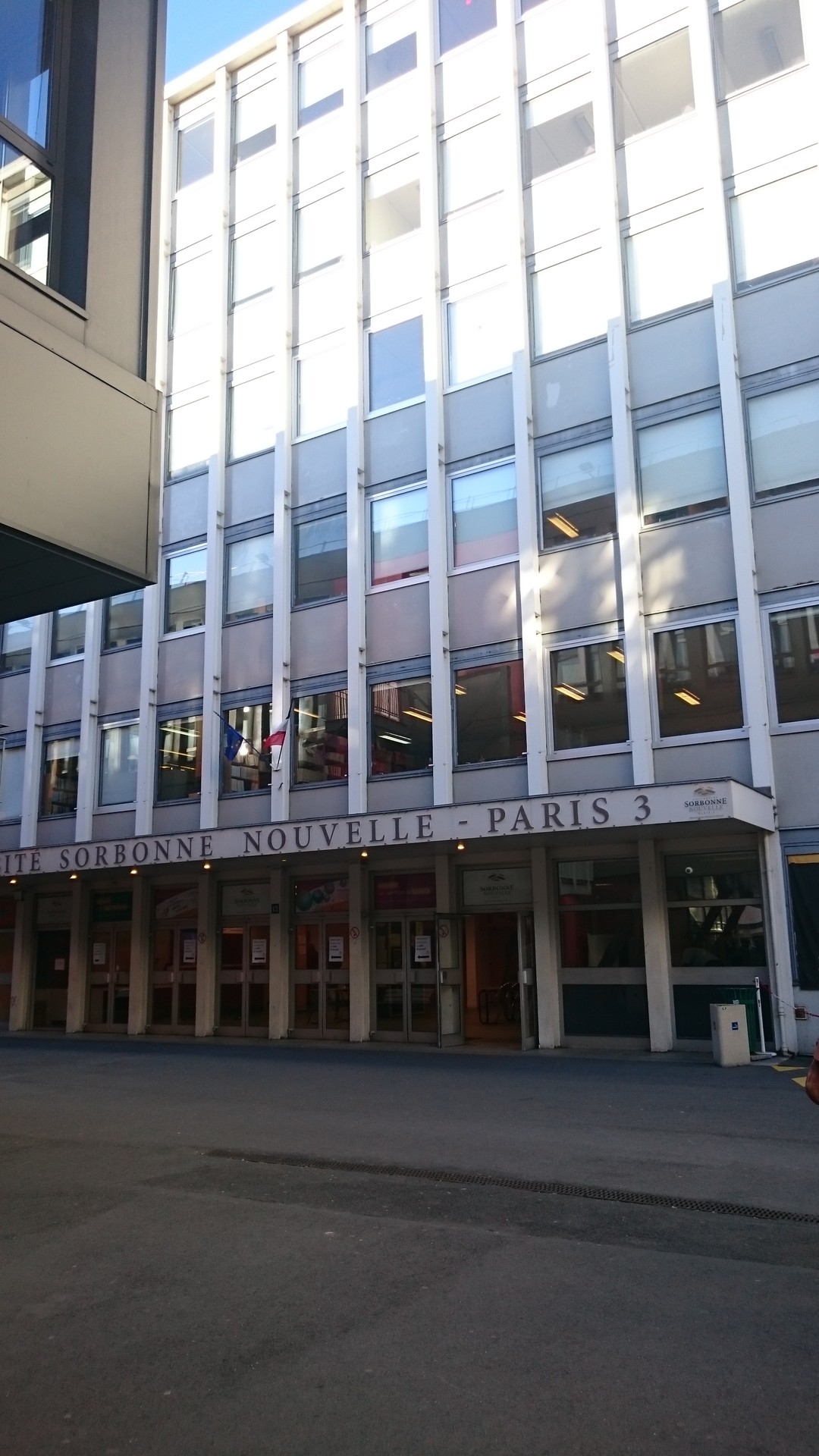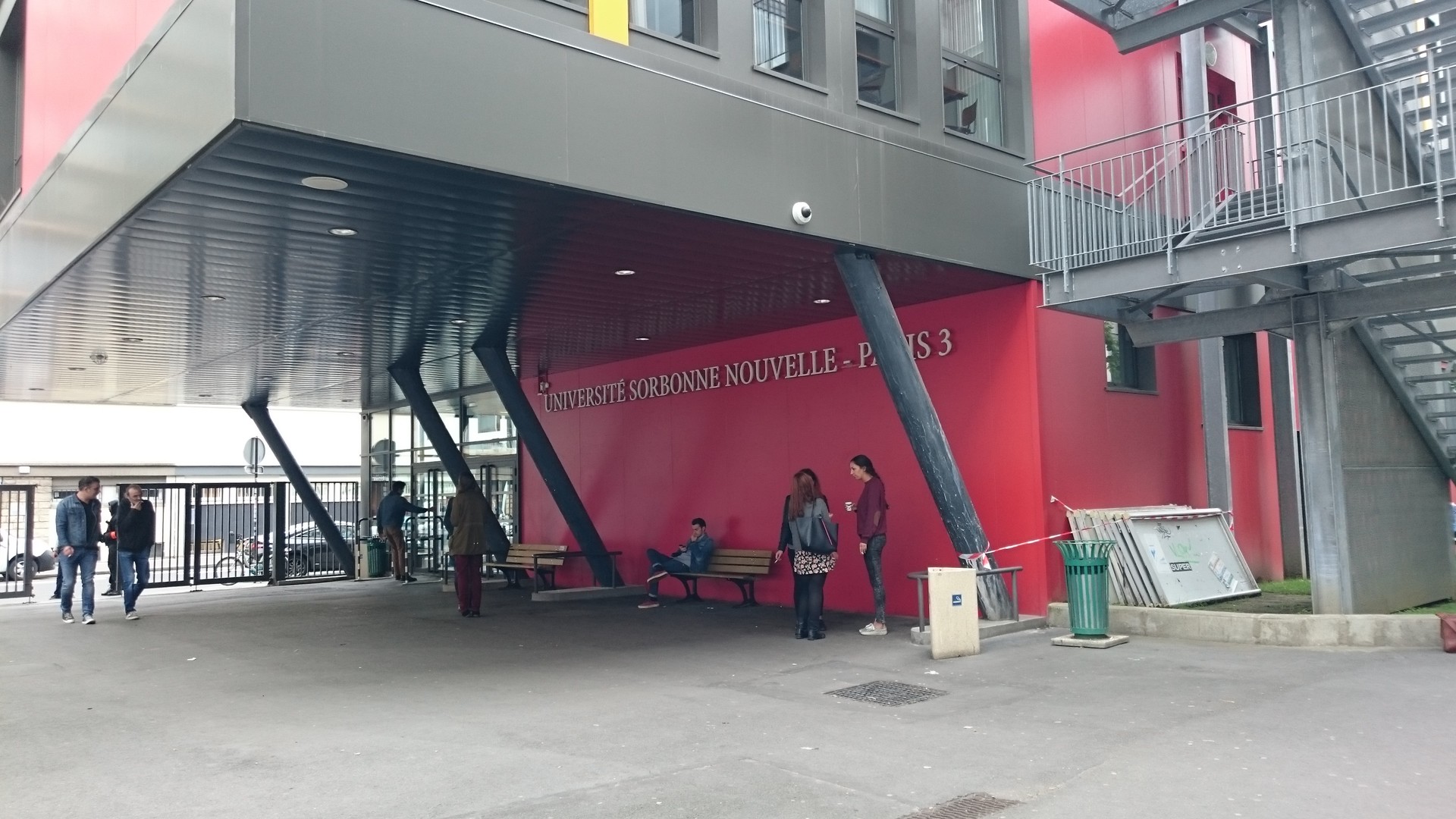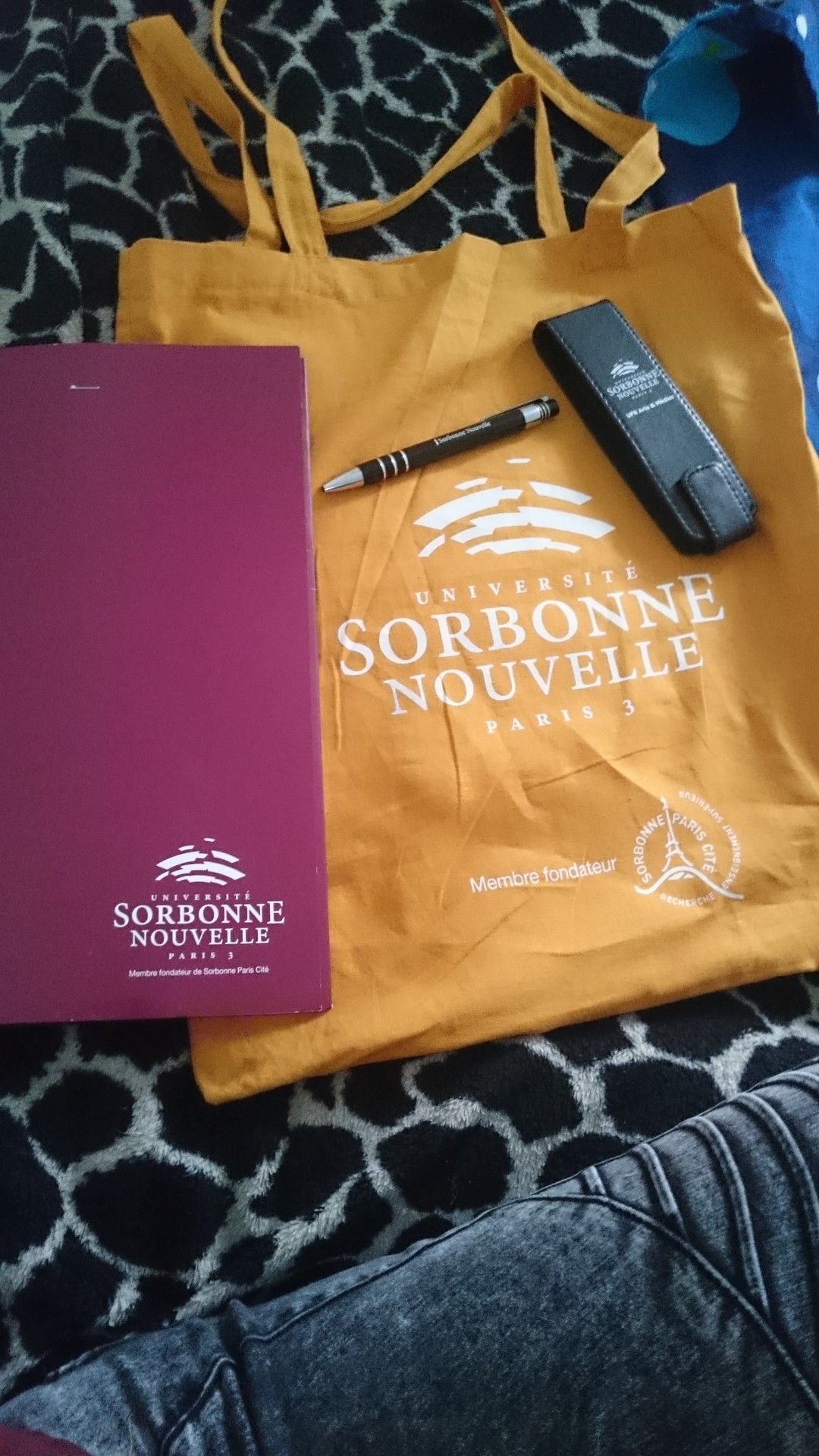Impressions from university
I want to give you some impressions about the daily life at French universities, especially the Sorbonne Nouvelle, which I attended. The Sorbonne Nouvelle Paris 3 is part of the universités de la Sorbonne, which are three universities: the Panthéon-Sorbonne, the Sorbonne Nouvelle and the Paris-Sorbonne. In total Paris has 13 different Universities. The universitiy that is lucky enough to be in the old building is the Panthéon Sorbonne and I will tell you more about this building in another post. My Sorbonne Nouvelle is in a newer building, which you can see here in the pictures.


When entering the university, you have to show you ID and students card and open your bags for having them controlled. If you don’t do that, you are not allowed to enter the campus. On the Campus you have four buildings for the classes and teacher’s offices. It may happen that your classes will be taught in another building and you might be sent on your way to search for that with a helpful – I don’t know either, where that might be-. Until now, I was lucky enough to find everything. The first day - which was an orientation day and had an exam for getting to know our level of French, we got some welcome presents from the university.

Overall impression about the courses
The courses take between one and half or two hours, depending of they are introduction courses (2h) or higher courses (1, 5h). I don’t have many lectures, but mostly exercises, as I took almost only courses from the third year. Normally, you have an CM (cours magistral), where you learn about the theoretic backgrounds, and a TD, where you practice the learned. Generally, the courses are really small with about 20 people, but you might also be even luckier and have a course with 10 or less students. This is especially nice, as you learn a lot more. Most of the teachers are really fair and helping with Erasmus students, but pay attention, not all of them are like that. As well, their attitude varies a lot. Some of them, might arrive always half an hour late and then would ask, tiping on their vibrating phones, which course they had now. Then, there are the other ones, that would not let enter anyone, who arrives five minutes late, banish cellphones and oblige you to do and hand in your homework on time. Some of them are really easy going and spontaneous about their classes, others just read out aloud word by word their perfectly prepared texts about the class materials. They are taking the German word “Vorlesung” a bit too serious.
You have two different types of studying here. You can either do it alongside with your work, do all your stuff on your own and “just” write a big exam, which are the examens finaux. We, Erasmus students, have to do the contrôle continue, which means we have to be always present and write a mid-term, as well as a final exam. In some classes you might have to do an oral presentation or an essay on top of that.
My courses
Now, I will give you an overview about my courses, that I took in Paris to give some more insight in the educational system. The university is departed in departements.
In the Department LEA (Langues étrangères appliquées, in English Foreign Applied Languages), which is the department most similar to my studies in Germany, I took two Portuguese classes in the first semester. The problem was that a level of B2 was obligatory, which I didn’t have, but they wouldn’t let me into the language course of my level, so I took these two. I tried my best and the teachers knew, that my level was lower and always evaluated me on my level. One of the courses was called Compréhension oral et écrit and was about oral and written expression. We learned a lot about pronunciation, emphasis, addressing manners and some grammatical issues. This was one of the courses, where an oral presentation was needed, and it should be completely free and without any notes. After explaining my professor that I would not be able to talk about political stuff for thirty minutes, me and the other Erasmus students just became the task to talk about our home country. In the exam, we had to sum up a text of about 350 words and then write an argumentation or a synthesis. We, luckily, had the opportunity to choose instead of the last task to answer some questions, which was more on my level. The second course was Grammaire, just grammar. We talked about articles, pronouns, adjectives, prepositions, adverbs, conjugations, nouns and similar stuff. We didn’t learn anything about tenses, I think that will be part of the second semester. Sadly, because I would have profited a lot from that for my home university. The exam was really well structured with some grammatical questions and sentences to translate.
In the third semester, I took two English courses, which belonged together. One was called Anglais Langue de Spécialité. On the plan was writing a CV, letter of motivation and job interviews, which sounds really practical and helpful for entering in the job life. The other one was Pratique et Technique de la Traduction. I was really interested in this one, because I love translation and we would learn a lot about that. The only problem was that the translation was about economic texts from English to French, which is harder for me, because none of them are my native language. Even though, I really liked it.
In the fifth semester, I took the advanced version of these two courses. Anglais Langue de Spécialité, where we studied companies and communication strategies. That was a really nice course, because we also had to do a project, which would be part of our grade. We had to organize an advertisement campaign and present it in class. Our Idea was about a perfume that gives confidence and will transfer you from the unnoticed girl into Cinderella. I think, out Storyboard and presentation were really good. We had a lot of fun and got a long very well. The final exam was about analysis of companies. Traduction Appliqué, which was the same course as the other one in the third semester, but on a higher level.
In the Départment du monde Anglophone, I took part in three classes. One was about British Cultural Studies in the first semester (I really needed this for my home university and they only offer it in the first semester). It was about Britain in an Age of Revolutions. That was, by the way, the course, where the teacher was only reading from her written text, but would ask the students to hold their oral presentations without any notes. The exams in this course, where analysing texts and commenting on them, which I didn’t really see as cultural studies, but even though, I learnt a lot and had good grades. The counterpart to this one is American Cultural Studies in the fifth semester. This course is a lot more interactive, but also oriented on just one period in American history. I would had more interest in talking about recent happenings. The evaluation will be on a presentation and two essays.
The last course is from the Départment Germanique Traduction vers la langue maternelle, which means we translate texts from French to German and it was especially for German students. The only problem here is not to fall asleep due to speed, tone and melody of the teacher’s voice! But, in the end it turned out to be a good course.
Exams
In the beginning, I was afraid about the exams, because I didn’t know how everything was organized in France. In your own country, you know the rules after some time and feel more comfortable. In the first semester teacher pay more attention to that, but in higher ones you should already know all that. But as I had mostly courses in higher semesters, I was really nervous. First thing was that I had to buy a new notebook, because exams on the normal, checked papers were not accepted. They use some strange paper with assymetrical lines, which I personally cannot see any sense in, but ok, however you like it, I am capable of adapting. The next thing is, that here I have a lot more effort to put in everything than at home, where we normally only have final exams and maybe a presentation. Here, the mid-terms started already in October until November and in December we had our final exams and in between presentations and essays, so not much free time left.
Presentations are handled a bit different to in Germany. Here, we are not allowed to bring any notes, that’s ok for a presentation of three minutes as in BCS, but not for 20 minutes, as in ACS! How should I do that? So, I just waited to see the first presentations to know what would be expected. Without any notes means reading word for word from your sheet of paper, or even from your cellphone or laptop. I was really shocked! I don’t know how a cam to the conclusion that without notes meant without notes? The next thing is, that everyone sits in front of the class, which would be the worst thing to do in Germany, and speak quiet und not understandable to the floor … But then I knew that I also could bring some notes, which were of course only notes and I only looked at them, when I forgot something, as I learned it in school. I presented everything freely and clear and everyone looked at me in a strange way. Maybe it was because I talked, while standing not sitting, but until today I don’t know it… It is also very suspicious that many students are just ill at the day of their presentations, which does not have any consequences. Same with exams, half of the class is missing.
It was already in the end of the semester that I got to know that in France it is the average grade that counts, so if you fail a class, but achieved a high grade in another, you just pass both of them. Which didn’t help me anything, because in Germany this is not working. If you fail, you fail and have to redo it next semester.
You see: a lot of things were really different, but you just have to be open-minded and ask a bit around to adapt yourself to the new situations.
Photo gallery
Content available in other languages
- Italiano: Impressioni sull'università
- Español: Mis impresiones sobre la universidad
Want to have your own Erasmus blog?
If you are experiencing living abroad, you're an avid traveller or want to promote the city where you live... create your own blog and share your adventures!
I want to create my Erasmus blog! →




















Comments (1 comments)